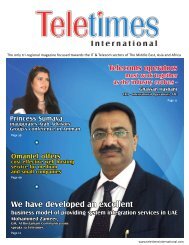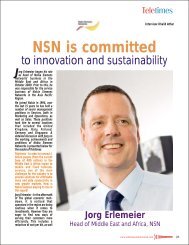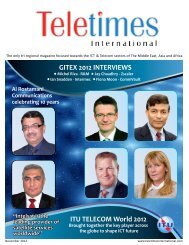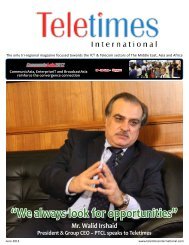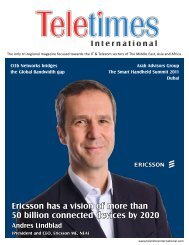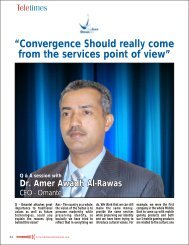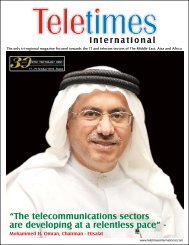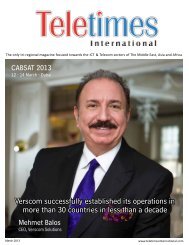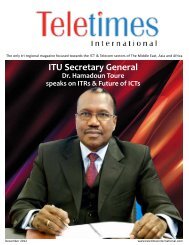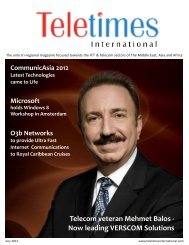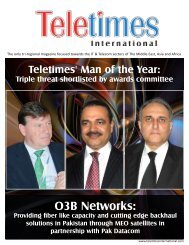Teletimes April 2011.pdf
Teletimes April 2011.pdf
Teletimes April 2011.pdf
You also want an ePaper? Increase the reach of your titles
YUMPU automatically turns print PDFs into web optimized ePapers that Google loves.
usiness models are largely<br />
unproven and there is no clear<br />
benchmark model to adopt.<br />
However, it is clear, that<br />
partnerships will be necessary<br />
as no single player will have<br />
all the essential capabilities<br />
required to deliver such<br />
solutions. Hence, the resulting<br />
business model and selection<br />
of partners will depend on the<br />
MNO’s technological, as well as<br />
its commercial, regulatory and<br />
organizational capabilities.<br />
Fundamental technological<br />
capabilities necessary to<br />
launch mHealth services<br />
include a scalable network<br />
architecture to support M2M<br />
business, an agile service layer<br />
architecture, an enterprisebased<br />
OSS/BSS architecture<br />
and security systems. Key<br />
commercial capabilities include<br />
the experience of a reliable<br />
health care service provider,<br />
strong consumer brand, large<br />
customer base and broad retail<br />
distribution channels. An<br />
assessment of these factors has<br />
lead to five potential business<br />
models (see Figure 1).<br />
The mHealth opportunity for<br />
an MNO is significant, but the<br />
value created will have to be<br />
shared among the partners<br />
delivering the mHealth service.<br />
Our expert analysis shows<br />
that operators which play<br />
only the connectivity role<br />
can access up to 20 percent<br />
of the mHealth market<br />
value, but there is potential<br />
to retain approximately 45<br />
percent of the market value<br />
when delivering end-to-end<br />
solutions. Hence, in order to<br />
limit the value that it must<br />
share with partners, the MNO<br />
should focus on maximizing<br />
its contribution by making the<br />
most of its internal capabilities.<br />
Keep it simple for emerging<br />
markets mHealth solutions<br />
bring basic health care to the<br />
masses<br />
In emerging markets, mHealth<br />
solutions, such as the delivery<br />
of medical information by SMS<br />
or MMS, medicine reminders,<br />
remote data collection, and<br />
medical help-lines, can help<br />
improve patients’ access to<br />
basic medical care.<br />
The delivery of health<br />
information by SMS can be<br />
used to raise awareness and to<br />
educate the population. The<br />
mHealth Company (MHC),<br />
based in Saudi Arabia, is<br />
working with several MNOs<br />
in the region to provide<br />
comprehensive health<br />
education by SMS and MMS.<br />
One such partner is Saudi<br />
Telecom Company, which<br />
recorded a peak of 430,000<br />
monthly subscriptions with<br />
a 70 percent retention rate.<br />
Overall, MHC has achieved<br />
a total subscriber base of 2<br />
million since its launch in 2009.<br />
Another relatively basic<br />
mHealth service is a helpline<br />
that connects mobile<br />
phone callers to a health<br />
care call center staffed by<br />
trained specialists. While this<br />
service keeps the technology<br />
requirements low for the<br />
patient, it requires more health<br />
care resources to be located at<br />
the call center.<br />
Additionally, health care<br />
providers can use mHealth<br />
services to provide remote<br />
diagnosis support to field<br />
staff and also to suggest<br />
treatments. Health care experts<br />
located in a central facility can<br />
use the service to remotely<br />
support in-field health care<br />
workers with PDAs or a laptop<br />
computer equipped with a<br />
mobile broadband or video<br />
conferencing.<br />
In emerging markets, MNOs<br />
must drive mHealth, often in<br />
cooperation with NGOs<br />
In emerging markets and<br />
especially in rural communities,<br />
MNOs are most likely to take<br />
on a “lead partner” business<br />
model to offer basic services.<br />
As investment costs are likely<br />
to be higher and ARPU<br />
lower, the focus must be on<br />
capturing a large subscriber<br />
base. The role of NGOs and<br />
government agencies will be<br />
critical in capturing a broad<br />
subscriber base as they have<br />
the expertise and reach essential<br />
to penetrate this market<br />
and raise awareness of the<br />
service.<br />
Roshan, Afghanistan’s<br />
largest MNO, has adopted<br />
this approach by partnering<br />
with the Aga Khan Fund for<br />
Economic Development. With<br />
its NGO partner, it has been<br />
56 www.teletimesinternational.com<br />
15Apr - 14May 2011



